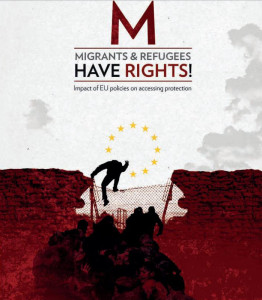This report is Caritas Europa’s studied response to the tragedy hundreds of thousands of women, men and children face when seeking refuge in Europe. People escaping war, repression and violation of human rights turn to Europe in the hope of finding a safe haven, but instead meet with denial of protection and rejection of solidarity. Caritas Europa observes that certain policy responses by both the European Union (EU) and European government leaders belie core European values and contradict fundamental Christian teaching, as well as the foundation behind the EU project. With this report, Caritas Europa wants to contribute to this political debate and propose solutions to the ongoing tragedy of migration. It is based on the experiences of Caritas organisations across Europe working to secure protection and human rights of migrants and refugees.
The stories and testimonies of those who make it to Europe demonstrate the urgency of the situation. Caritas Europa seeks to contribute to appropriate humanitarian responses by providing evidence about the situations of migrants and asylum seekers, supported by insight from Caritas’ staff and volunteers helping the people in need. It provides an in-depth analysis of the impact that current EU asylum and migration policies are having on migrants in Europe.
Along with reviewing the situation of migration in Europe, the report also analyses the root causes of migration to Europe. It identifies five main areas where law and policy may hamper migrants from accessing international protection or ensuring human rights. These include: (1) access to protection, humanitarian visas and resettlement; (2) the non-refoulement principle; (3) family reunification; (4) labour migration and mobility; and (5) irregular migration. Each of these areas is built upon testimonies of refugees and migrants, analysis of relevant EU law and policy and recommendations for solutions. This report also offers a solid foundation for policy advocacy and local action to promote a Europe of true solidarity, justice and well-being for all, including migrants. Appropriate responses can only derive from recognising that migrants and asylum seekers are not a “flow” nor an “invasion”, but are women, men, and children, whose human rights and needs are being jeopardised.





